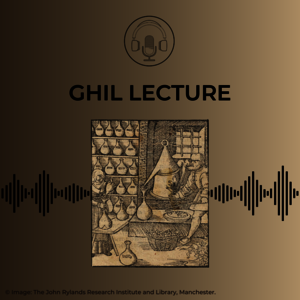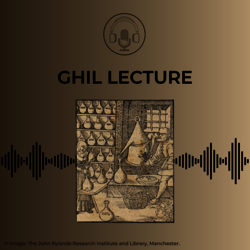 GHIL Podcast
GHIL Podcast

GHIL Lecture
Stefan Hanß
The Scientific Analysis of Renaissance Recipes
Medicine and the Body in the German Material Renaissance
3 July 2023
(0:45 h)

GHIL Lecture
Stefan Hanß
The Scientific Analysis of Renaissance Recipes
Medicine and the Body in the German Material Renaissance
GHIL Lecture, given 24 February 2023
The ‘material Renaissance’, historians have argued, was an age of experimentation, and recipes were at the heart of this cultural movement. New collaborations between the humanities and the sciences allow for novel insights into Renaissance recipe cultures, and more specifically the degree of material experimentation and engagement by ‘recipe practitioners’. Scientific analysis and thorough historical contextualization of the chemical fingerprints of recipe users offer a new understanding of material cultures, medicine, and the history of the body in early modern Germany. Which ingredients were used? How were they used, and what for? Which substances were altered, and why? And what can be said about their impact on the human body? This lecture focuses on early modern Augsburg and discusses topics as wide-ranging as haircare and toothache. It contributes to research on recipes, as well as to the new history of material practices, early modern medicine, and material and medical practitioners in early modern Germany.
Stefan Hanß is Senior Lecturer in Early Modern History at the University of Manchester and the winner of a British Academy Rising Star Engagement Award (2019) as well as a Philip Leverhulme Prize in History (2020). Hanß works on cultural encounters and global material culture, currently with a focus on the history of hair and featherwork, and on establishing new collaborations between the humanities and the sciences. In September 2023, Hanß takes on the role as Deputy Director and Scientific Lead of the John Rylands Research Institute Manchester. His research has been widely published in, among others, History Workshop Journal, Past & Present, Renaissance Quarterly, and The Historical Journal. He is the author of two monographs on the Battle of Lepanto and Narrating the Dragoman’s Self in the Veneto-Ottoman Balkans, c.1550–1650 (Routledge, 2023). Hanß has co-edited Mediterranean Slavery Revisited (500–1800) (2014), The Habsburg Mediterranean, 1500–1800 (2021), Scribal Practice and Global Cultures of Colophons, 1400–1700 (2022), and, most recently, In-Between Textiles, 1400–1800: Weaving Subjectivities and Encounters (2023). He is currently in the final stage of writing a new book on the early modern history of hair.
Don't miss the accompanying interview: PR Officer Kim König and Research Fellow for Colonial and Global History Mirjam Brusius talk to Stefan Hanß about his research project which uses the scientific analysis and historical contextualization of the chemical fingerprints of Renaissance recipe users to offer a new understanding of material cultures, medicine, and the history of the body in early modern Germany.